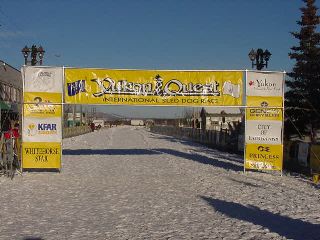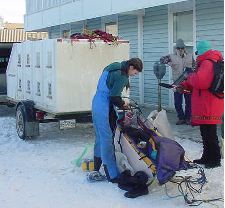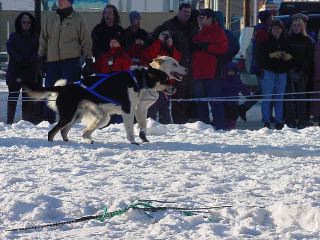The Yukon Quest began as a shared dream of musher LeRoy Shank and non-musher and historian Roger Williams. They dedicated their vision to the gold seekers, mail carriers, trappers and the traders who settled the great North during the turn of the century.
This international sled dog race began in 1984 with 26 teams and covers 1,000 miles / 1,600 km of rough and sometime hazardous terrain between Whitehorse, Yukon and Fairbanks, Alaska. This event takes place each year in mid February amid an atmosphere of unpredictable, cold and sub-Arctic weather. The starting point alternates between the two cities, even years from Fairbanks, odd years from Whitehorse. The race starts on schedule regardless of weather and will take from 9 to 13 days to complete, depending on weather conditions encountered on the trail. Only the Race Marshal, with approval from the YQI Rules Committee, can change the starting place and time.

The race continues to gain in fame and in international status each year. The 37th running of the Yukon Quest will begin in Fairbanks Alaska on Saturday, February 1, 2020 at 11:00 a.m. local time. The Quest allows no more than 50 entrants and the prize money is divided between the first 15 finishing teams. The entry fee for the Race is $2000.00 US.
Drivers ( mushers ) must be at least 18 years of age and have demonstrated the ability to complete a long distance sled dog race. Rookie drivers must submit written verifications of their completion of a 300 mile YQI sanctioned race and one other YQI sanctioned race of at least 200 miles (500 miles minimum). Completing at least 300 miles of the Yukon Quest or the Iditarod will fulfill the 300 mile race requirement. Qualifying races must be completed within 42 months of the start of the Yukon Quest Race. Iditarod Finishers are qualified to enter the Yukon Quest.
Drivers must start the race with no less than eight (8) dogs and no more than fourteen (14) dogs; and must finish with no less than six (6) dogs. Dogs may not be added to a team after the start of the race. An expired dog does not count as a dog for the minimum required. Only dogs suitable for arctic travel will be permitted to enter the race.
There are 11 official checkpoints along the trail, including Fairbanks and Whitehorse. Pelly Crossing, Yukon was added to the 1996 race for the first time and the 1999 Race saw Braeburn Lodge as a first time Checkpoint. A change for the 2009 race was the replacement Angel Creek for Two Rivers as a Checkpoint. Mile 101, previously a dog drop, was given Official Checkpoint status in 2010.
Dogs are checked by the Veterinarians provided by the Yukon Quest at every Checkpoint and in some instances at a designated dog drop area such as Scroggie Creek, McCabe Creek or Slavin's Roadhouse.
No dog teams are permitted to leave the Checkpoints until the dogs in that team are in condition to finish the race. Dog care is of the utmost importance.
The Official Race Rules are published each year, there are sometimes slight changes in the rules to provide the best conditions for both musher and the dogs. All mushers are bound by the rules, any infractions of the rules can lead to fines, time penalties, disqualification which sometimes leads to censure from subsequent races.
All food and equipment must be in cloth burlap bags or woven poly bags, permanently marked with the driver or kennel name, with a maximum weight of 40 lbs / 18.1kg.
The following items must be presented to the checker before checking in at each checkpoint:
- Proper cold weather sleeping bag.
- Hand ax with an overall length of at least twenty-two (22) inches/56 centimeters.
- One pair of snowshoes with bindings, with an area of approximately two hundred and fifty (250) square inches/1612 square centimeters each.
- Veterinary records (loss will incur a five hundred dollar ($500) fine.) The veterinary book must be returned to a Race Judge upon completion of the race or when withdrawing for any reason.
- Any promotional material that YQI has asked the driver to carry to Fairbanks/Whitehorse. YQI may require 1 or 2 banners of up to 400 square inches (2580 square centimeters) be displayed on the sled as directed.
- Functional cooker
- An adequate amount of fuel to bring three (3) gallons of water to a boil.
In addition, eight (8) booties for each dog, either in the sled or in use and in the sled, are required when a driver signs out of each checkpoint. Drivers should have these items in their possession at all times. If a driver loses a required article of gear between checkpoints, he/she cannot check in at the checkpoint until he/she has acquired and replaced the lost item. In the event of accidental and unavoidable loss along the trail, the driver will be allowed to replace the missing item(s) from a public source at the next checkpoint before checking in. The driver may also obtain items from a private source with the approval of the Race Marshal or Race Judge.
In addition to the mandatory gear listed above, items relative to the safety of the dog teams and drivers (i.e. sled brakes, mittens, etc.) may be replaced with the Race Marshal or Race Judge's approval.
Should any mandatory gear be missing at the finish, a fine of $1,500 will be assessed for each item.
A map, compass, parka, canine first aid kit, flares, and dog blankets are recommended. Personal Locator Beacons ( PLB) will be allowed at the Driver's discretion. Two-way communication devices of any kind will not be allowed. Excess food or gear may be given only to residents along the trail or other mushers. A musher carrying a GPS must declare it to the Race Marshal prior to the start of the race.
Straw must also be shipped in a wrapped bale. if a musher chooses to do so. Straw is provided at each checkpoint (and half a bale at dog drops) by the organization. Mushers may purchase additional straw at each checkpoint in advance.
All equipment and personal gear a musher may need in a checkpoint must be shipped to that checkpoint prior to the start of the race.
Each musher must carry at least 8 booties for each dog per 30 miles / 50 km, picking up new ones in his gear already at the checkpoints. All dogs will be on the towline or carried in the sled bag if they become injured or tired.
Food must also be provided for the dogs. With the new foods on the market some mushers may carry less poundage for the dogs, other traditional methods may include light weight commercial dog food supplemented with lamb, chicken, salmon or white fish.
Strategy and routine are an important part of the race. If the days are too warm the team will run at night and rest during the day. A musher may run the dogs in a four on, four off pattern. The musher must be prepared for very cold nights which could drop to more than -40 C. Teams run and rest often. During a typical stopover, mushers will build a fire, cook, check and feed the dogs before him/herself and catch a few hours of sleep.
 There is one mandatory thirty-six (36) hour stop at Dawson City, Yukon. Other mandatory stops include: Mile 101 or Central, musher’s choice, 4 hours.The starting time differential is added to the layover time at the chosen checkpoint. Eagle is a mandatory 4 hours, Braeburn is a mandatory 8 hours.
There is one mandatory thirty-six (36) hour stop at Dawson City, Yukon. Other mandatory stops include: Mile 101 or Central, musher’s choice, 4 hours.The starting time differential is added to the layover time at the chosen checkpoint. Eagle is a mandatory 4 hours, Braeburn is a mandatory 8 hours.
During each mandatory stop, every team will be evaluated by a YQI veterinarian. The musher must be present during the evaluation. Vet books will be signed by the examining vet and musher. Race Veterinarians will report their findings to Race Officials. Time penalties will only be served at the following designated mandatory stops: Dawson City or Braeburn. Any time penalties assessed after Braeburn will be added to the overall finish time. Dawson City is the only checkpoint that a musher may receive outside help. This is where the handlers take over, the musher is able to get rested and prepared for the last leg of the race.
Sportsmanship is key to the positive image and success of the Yukon Quest. The Code of the North dictates that all travelers be courteous, helpful, generous and honorable. Drivers are reminded to "Conduct yourself well enough so that the next driver will be welcomed with equal hospitality. Rude behavior or inappropriate actions by a driver or handler will result in a penalty. Any competitor or athlete worthy of the name realizes that all people—officials, volunteers, media, and fans—are equal participants in this event, and that it is the driver's responsibility to define the upper limits of human performance. A true Sportsman is an inspiration to all witnesses".
The Yukon Quest gets it's name from the old " Highway of the North", the Yukon River, and traces the path that the prospectors followed to reach the Alaskan Interior from the Klondike during the Gold Rush.
The first musher over the 1984 starting line was "Pecos" Humphreys, with Sonny Lindner winning that first race. The first Canadian to have won the race was Bruce Johnson of Atlin B.C. in 1986. Tragedy struck the racing world with the untimely death of Bruce Johnson in November 1993, on a training run, as Bruce prepared his team for the 1994 race.
In 1984 Lorrina Mitchell was the first woman to cross the finish line and was the first female race Marshal in 1995. Since then several other women have entered the race. In 1989, Yukoner Jennine Cathers became the youngest musher to have entered the race.
In 1989, 90, 91, 92 and 1993, Jennine and her father Ned, were the only father daughter combination to have entered the race. The 1998 Race saw Rick and Brenda Mackey join ranks with the Cathers duo. In 1990 Linda and Will Forsberg ran as a husband and wife team, Connie and Terri Frerichs ran as a mother and daughter team.
In 1995, Frank Turner beat Charlie Boulding's 1991 winning time of 10 days, 21 hours and 12 minutes with a new record of 10 days, 16 hours and 20 minutes.
First musher to win the Yukon Quest twice: Charlie Boulding in 1991 & 1993
First musher to win the Yukon Quest 3 times (and in a row): Hans Gatt in 2002, 2003 & 2004
First musher to win the Yukon Quest 4 times (and in a row): Lance Mackey in 2005, 2006, 2007 & 2008
The fastest Quest of all was won by Allen Moore in 2014 with a new record time of 8 days, 14 hours, 21 minutes.
The longest Yukon Quest (1988) race finished in 20 days, 9 hours and 16 minutes (Ty Halvorson). 2009 saw the first 2 teams finish within 4 minutes of each other.
In 2012, the time difference between first and second was 26 seconds.
Aily Zirkle, is the first and only female musher to have won the Race. She completed the race in 10 days, 22 hours and 57 minutes, in February 2000.